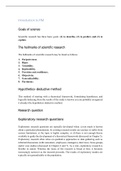Introduction to RM
Goals of science
Scientific research has three basic goals: (1) to describe, (2) to predict, and (3) to
explain.
The hallmarks of scientific research
The hallmarks of scientific research may be listed as follows:
1. Purposiveness.
2. Rigor.
3. Testability.
4. Replicability.
5. Precision and confidence.
6. Objectivity.
7. Generalizability.
8. Parsimony.
Hypothetico‐deductive method
This method of starting with a theoretical framework, formulating hypotheses, and
logically deducing from the results of the study is known as (you probably recognized
it already) the hypothetico‐deductive method.
Research question
Exploratory research questions
Exploratory research questions are typically developed when: a) not much is known
about a particular phenomenon; b) existing research results are unclear or suffer from
serious limitations; c) the topic is highly complex; or d) there is not enough theory
available to guide the development of a theoretical framework (discussed in Chapter 5).
Exploratory research often relies on qualitative approaches to data gathering such as
informal discussions (with consumers, employees, managers), interviews, focus groups,
and/or case studies (discussed in Chapter 6 and 7). As a rule, exploratory research is
flexible in nature. Whereas the focus of the research is broad at first, it becomes
increasingly narrower as the research proceeds. The results of exploratory studies are
typically not generalizable to the population.
,Descriptive research questions
The objective of a descriptive study is to obtain data that describes the topic of interest.
Descriptive studies are often designed to collect data that describe characteristics of
objects (such as persons, organizations, products, or brands), events, or situations.
Descriptive research is either quantitative or qualitative in nature. It may involve the
collection of quantitative data such as satisfaction ratings, production figures, sales
figures, or demographic data, but it may also entail the collection of qualitative
information. For instance, qualitative data might be gathered to describe how
consumers go through a decision‐making process or to examine how managers resolve
conflicts in organizations. Descriptive studies may help the researcher to:
1. Understand the characteristics of a group in a given situation
2. Think systematically about aspects in a given situation
3. Offer ideas for further probing and research
4. Help make certain decisions
Causal research questions
Causal studies test whether or not one variable causes another variable to change. In a
causal study, the researcher is interested in delineating one or more factors that are
causing a problem. The intention of the researcher conducting a causal study is to be
able to state that variable X causes variable Y. So, when variable X is removed or altered
in some way, problem Y is solved (note that quite often, however, it is not just one
variable that causes a problem in organizations).
Comparison
Correlational (exploratory and descriptive) studies are invariably conducted in non-
contrived settings, whereas most causal studies are done in contrived lab settings.
Type Examples
Descriptive • What is X?
• In what classes can X be distinguished?
Exploratory • Why does X happen?
• How can X be explained?
Explanatory • What is the cause of …?
• To what degree do factors X1, X2 explain Y?
• How does Y depend on X?
, Conceptual model
An intervening variable is one that surfaces between the time the independent
variables start operating to influence the dependent variable and the time their impact
is felt on it.
Literature review
In sum, some criteria for assessing the value of articles or books are: the relevance of
the issues that are addressed in the article or book, the importance of a book or article
in terms of citations, the year of publication of the article or book, and the overall
quality of the article or book.
Unit of analysis
Unit of analysis Unit of observation
The major entity being studied The unit described in the dataset
What the research question is about What each data point is about
Examples: Individual, team, group, Examples: Individual, team, group,
division, organization, alliance, division, organization, alliance,
industry, country industry, country
Changing the unit of analysis often implies that the research question needs to be
changed.






